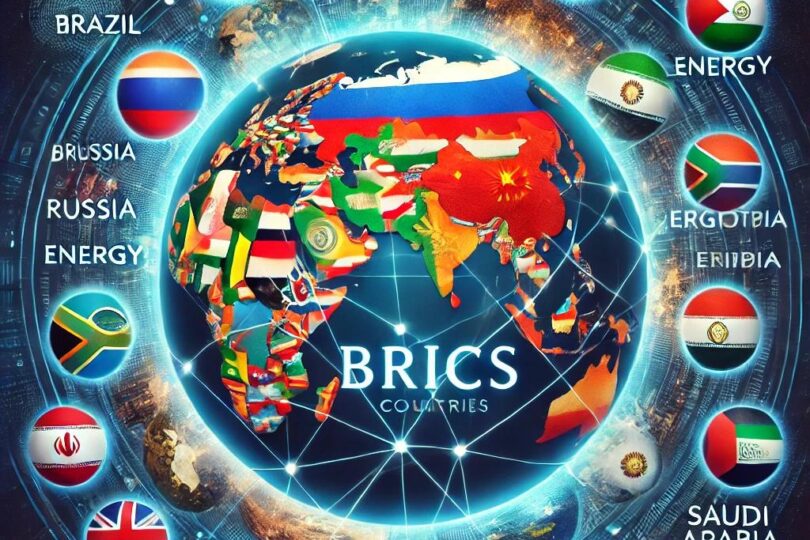The expansion of BRICS, now including Argentina, Egypt, Ethiopia, Iran, Saudi Arabia, and the UAE, signifies a profound shift in global geopolitics and economics. Initially founded by Brazil, Russia, India, China, and South Africa as a coalition of emerging economies, BRICS has increasingly become a platform for countries seeking alternatives to Western-dominated financial and political systems. With over 40 nations expressing interest in joining, BRICS is positioning itself as a counterweight to Western alliances like the G7, aiming to establish a more multipolar world order.
Economic Impact
The inclusion of resource-rich countries like Saudi Arabia, Iran, and Argentina bolsters BRICS’ influence on global energy markets. For instance, Saudi Arabia’s vast oil reserves and Argentina’s significant lithium deposits enhance the bloc’s strategic importance in the global energy landscape. These resources could allow BRICS nations to coordinate on critical mineral exports, reshaping global supply chains and challenging Western energy security strategies (United States Institute of Peace) (Forbes Africa).
Additionally, the expanded BRICS could reduce dependence on the U.S. dollar by promoting the use of local currencies for trade, further challenging Western financial dominance. This shift could have far-reaching implications for global trade, particularly as more countries seek alternatives to the dollar-centric financial system (Atlantic Council).
Geopolitical Shift
The expansion of BRICS reflects a growing desire among nations to reduce reliance on Western financial institutions and trade systems. Sanctions on Russia and rising tensions between China and the West have accelerated this trend, pushing countries to explore new alliances. By expanding its membership, BRICS is not just increasing its economic power but also its geopolitical influence, challenging the Western-led order and promoting a more inclusive global governance structure (Forbes Africa) (The Wire).
The inclusion of Iran, a nation under heavy Western sanctions, underscores BRICS’ role as a platform for countries seeking alternatives to Western-dominated systems. This move aligns with the bloc’s broader objective of establishing a multipolar world where developing and middle-income nations have a more significant say in global affairs (United States Institute of Peace).
Challenges and Opportunities
However, the expansion brings both opportunities and challenges. The new members come from diverse political and economic backgrounds, which could complicate decision-making within the group. Balancing the interests of countries like Iran, which faces Western sanctions, with those of other members such as Saudi Arabia, could present diplomatic challenges (Atlantic Council).
Despite these complexities, the expanded BRICS could offer a valuable forum for dialogue among these diverse nations. This could lead to more coordinated efforts on global issues such as climate change, trade reform, and economic development, enhancing the bloc’s relevance on the world stage (Forbes Africa) (The Wire).
Conclusion
The expansion of BRICS marks a pivotal moment in the global economic and political landscape. While it presents significant opportunities for increased influence, the bloc will need to navigate the complexities of its diverse membership to effectively shape global norms and policies. As BRICS continues to grow, its ability to foster cooperation among its members will be crucial in determining its impact on global affairs.
Hashtags: #BRICS #GlobalEconomics #Geopolitics #BRICSExpansion
Backlinks: United States Institute of Peace | Forbes Africa | Atlantic Council





The recent expansion of BRICS to include Argentina, Egypt, Ethiopia, Iran, Saudi Arabia, and the UAE is a fascinating development in global politics. This move signals a significant shift toward a multipolar world order, where countries outside of the Western-dominated systems are seeking greater influence. BRICS, initially founded by Brazil, Russia, India, China, and South Africa, is now positioned as a counterbalance to Western alliances like the G7.
One of the most intriguing aspects of this expansion is its economic implications. With resource-rich nations like Saudi Arabia and Argentina now part of the bloc, BRICS could significantly influence global energy markets and critical mineral supply chains. This shift could challenge Western energy security strategies, particularly as BRICS nations may collaborate on these exports.
Geopolitically, the inclusion of countries like Iran, which faces heavy Western sanctions, underscores BRICS’ role as an alternative platform for nations seeking to reduce their reliance on Western financial systems. This expansion reflects broader global trends where middle-income and developing nations seek a greater say in global governance.
However, this expansion is not without its challenges. The diverse political and economic interests of the new members could complicate consensus-building within BRICS. It will be interesting to see how the bloc manages these differences and whether it can effectively coordinate on global issues like climate change and trade reform.
Overall, the BRICS expansion is a pivotal moment in global affairs, and its future developments will be crucial in shaping the world order.